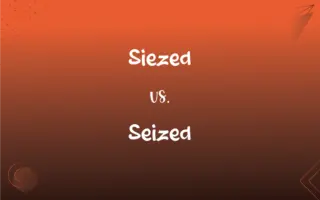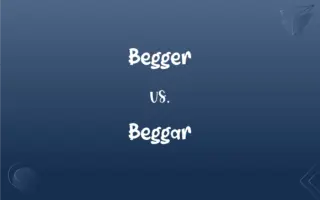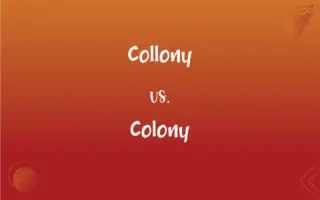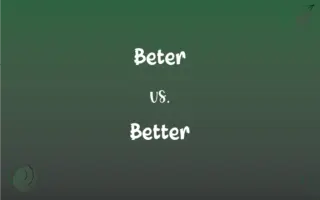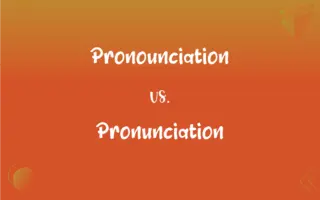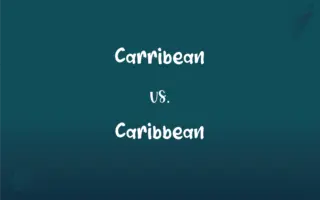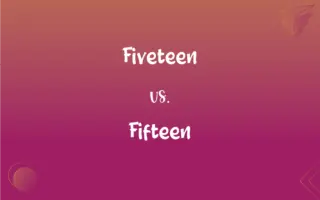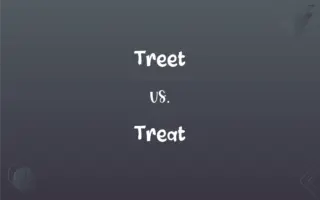Begining vs. Beginning: Mastering the Correct Spelling
Edited by Aimie Carlson || By Janet White || Updated on March 13, 2024
The incorrect spelling is "begining," while the correct spelling is "beginning." "Beginning" is a noun or verb form that denotes the start of something.
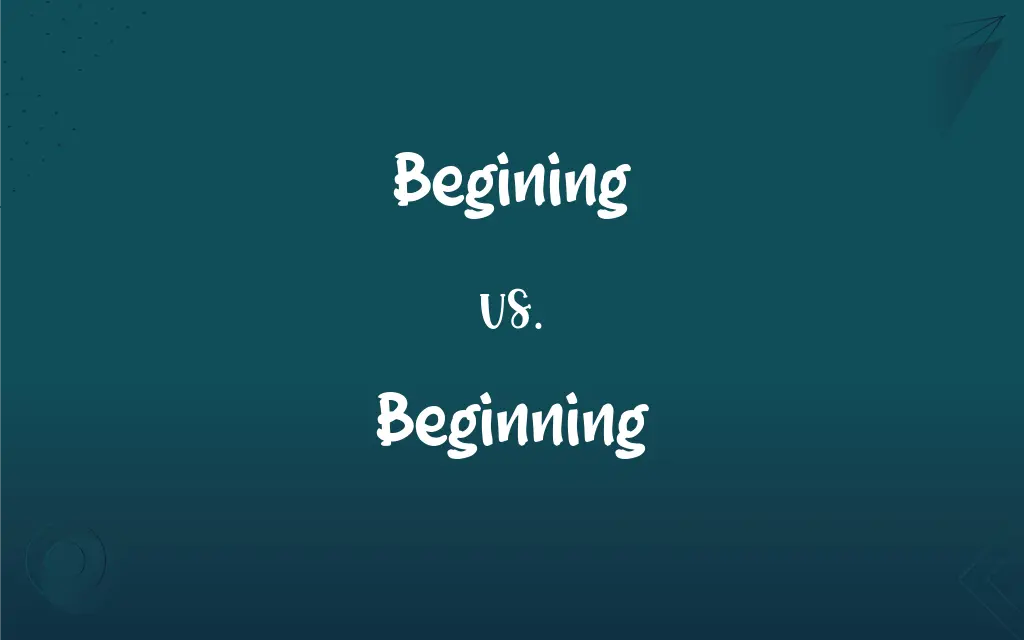
Which is correct: Begining or Beginning
How to spell Beginning?

Begining is Incorrect

Beginning is Correct
ADVERTISEMENT
Key Differences
Associate the double 'n' with a starting line in a race, indicating the "beginning" of the event.
The word is longer than "begin," as it signifies more than just to start — it is the start itself.
Double the 'n' to stress that something is actively starting.
Remember, it's the "beginning," so it deserves an extra 'n' for emphasis.
Think of "begin" + "ing," both of which have two 'n's.
ADVERTISEMENT
Correct usage of Beginning
At the begining of the year, she set new goals for herself.
At the beginning of the year, she set new goals for herself.
The begining of the book was slow, but it got better.
The beginning of the book was slow, but it got better.
He missed the begining of the movie.
He missed the beginning of the movie.
The story had an interesting begining.
The story had an interesting beginning.
It's important to have a strong begining when writing an essay.
It's important to have a strong beginning when writing an essay.
Beginning Definitions
"Beginning" refers to the initial stage or part of an event or process.
He was there from the beginning of the project.
"Beginning" can indicate the origin or source.
The beginning of the river is a glacier.
"Beginning" signifies the outset of a period or duration.
The beginning of summer is always hot.
"Beginning" may also refer to the initial position in a space or area.
Start reading from the beginning of the page.
The act or process of bringing or being brought into being; a start
The beginning of the universe.
The time when something begins or is begun
The beginning of June.
The place where something begins or is begun
At the beginning of the road.
The first part
The front matter is at the beginning of the book.
Often beginnings An early stage or phase
The beginnings of human life on this planet.
The source or cause
What was the beginning of the dispute?.
(uncountable) The act of doing that which begins anything; commencement of an action, state, or space of time; entrance into being or upon a course; the first act, effort, or state of a succession of acts or states.
That which is begun; a rudiment or element.
That which begins or originates something; the source or first cause.
What was the beginning of the dispute?
The initial portion of some extended thing.
The author describes the main character's youth at the beginning of the story.
That house is at the beginning of the street.
Present participle of begin
He is beginning to read a new book.
(informal) Of or relating to the first portion of some extended thing.
In the beginning paragraph of the chapter
In the beginning section of the course
The act of doing that which begins anything; commencement of an action, state, or space of time; entrance into being or upon a course; the first act, effort, or state of a succession of acts or states.
In the beginning God created the heaven and the earth.
That which begins or originates something; the first cause; origin; source.
I am . . . the beginning and the ending.
Enterprise.
The event consisting of the start of something;
The beginning of the war
The time at which something is supposed to begin;
They got an early start
She knew from the get-go that he was the man for her
The middle of the war
Rain during the middle of April
The first part or section of something;
`It was a dark and stormy night' is a hackneyed beginning for a story
A whole is that which has beginning, middle, and end
The place where something begins, where it springs into being;
The Italian beginning of the Renaissance
Jupiter was the origin of the radiation
Pittsburgh is the source of the Ohio River
Communism's Russian root
The act of starting something;
He was responsible for the beginning of negotiations
Serving to begin;
The beginning canto of the poem
The first verse
"Beginning" denotes the point at which something starts.
The beginning of the movie was captivating.
Beginning Sentences
The beginning of the novel sets the tone for the entire story.
The beginning of spring is marked by flowers blooming.
In the beginning, the universe was a singularity.
The beginning of the trail is the easiest part of the hike.
At the beginning of the meeting, we discussed the agenda.
The beginning of the recipe requires mixing the dry ingredients.
The beginning of her career was filled with challenges.
The beginning of his performance was met with applause.
The beginning of their friendship was unexpected.
The beginning of the project requires careful planning.
At the beginning of the century, technology started evolving rapidly.
The beginning of the river is in the mountains.
The beginning of the day is the best time for meditation.
The beginning of the lecture introduced the main concepts.
She always enjoys the beginning of a new book.
The beginning of the school year is always exciting.
The beginning of the play was captivating.
The beginning of the relationship was like a fairy tale.
The beginning of the journey took them through dense forests.
The beginning of the concert was delayed due to rain.
Learning a new language is difficult at the beginning.
At the beginning of the workshop, instructions were given.
The beginning of the dance routine is synchronized perfectly.
The beginning of the film sets up the mystery.
The beginning of the year is a good time to reflect and plan.
FAQs
What is the verb form of beginning?
"To begin" is the verb form.
What is the pronunciation of beginning?
Pronounced as /bɪˈɡɪn.ɪŋ/.
What is the root word of beginning?
The root word is "begin."
Which preposition is used with beginning?
"Of," as in "beginning of the year."
What is the singular form of beginning?
"Beginning" is both singular and plural, depending on usage.
What is the plural form of beginning?
"Beginnings."
Why is it called beginning?
It comes from the verb "begin," signifying the start or initiation of something.
Which vowel is used before beginning?
Generally, 'a' or 'the' is used before "beginning," depending on the context.
Is beginning an adverb?
No.
Which conjunction is used with beginning?
"And," as in "beginning and end."
Is beginning an abstract noun?
Yes.
Is the word beginning imperative?
No, it's not a verb form used for giving commands.
Is beginning a countable noun?
Yes, as in "multiple beginnings."
How many syllables are in beginning?
Three syllables.
What is the opposite of beginning?
End.
What is the first form of beginning?
Not applicable; it's primarily a noun.
Is beginning a negative or positive word?
Neutral; depends on the context.
Is beginning a vowel or consonant?
It's a word, not a vowel or consonant.
Is the term 'beginning' a metaphor?
It can be used metaphorically.
Which determiner is used with beginning?
"The," "a," "this," "that," depending on context.
Is beginning a collective noun?
No.
What is the third form of beginning?
Not applicable; it's primarily a noun.
Which article is used with beginning?
"The," as in "the beginning," or "a," as in "a beginning."
Is beginning a noun or adjective?
Primarily a noun but can be used as an adjective as in "beginning stages."
What is a stressed syllable in beginning?
The second syllable, "gin."
What part of speech is beginning?
Noun, can also be an adjective.
How is beginning used in a sentence?
Example: The beginning of the book was engaging.
How do we divide beginning into syllables?
Be-gin-ning.
What is another term for beginning?
Onset, commencement.
What is the second form of beginning?
Not applicable; it's primarily a noun.
About Author
Written by
Janet WhiteJanet White has been an esteemed writer and blogger for Difference Wiki. Holding a Master's degree in Science and Medical Journalism from the prestigious Boston University, she has consistently demonstrated her expertise and passion for her field. When she's not immersed in her work, Janet relishes her time exercising, delving into a good book, and cherishing moments with friends and family.
Edited by
Aimie CarlsonAimie Carlson, holding a master's degree in English literature, is a fervent English language enthusiast. She lends her writing talents to Difference Wiki, a prominent website that specializes in comparisons, offering readers insightful analyses that both captivate and inform.

